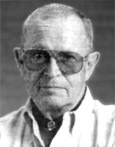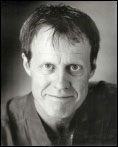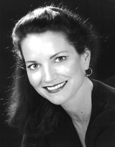




|
| No one can be good
for long if goodness is not in demand.
|
| —First god, in The
Good Woman of Setzuan |

Directed by Cynthia Meier
Musical direction by Harlan Hokin
Featuring Big Head Puppets by Tucson
Puppet Works
Produced by special arrangement with Samuel French, Inc.
March
29–April 15, 2007
Thursday–Saturday 7:30 PM,
Sunday 2:00 PM
Live preshow music by the Summer Thunder Chinese Music
Ensemble begins 15 minutes before curtain
Preview Night Thursday March 29 7:30 PM
Pay-What-You-Will Nights Thursdays April 5 & 12 7:30 PM
Performance Schedule
Zuzi’s Dance Theatre, Historic YWCA, 738
North Fifth Avenue at University Boulevard
See
Map
In this parable, the gods come to earth in search
of a thoroughly good person.
They encounter Shen Te, a good-hearted but penniless prostitute
who, to muster sufficient ruthlessness to do good
and survive in an evil world, must disguise herself.
View the full
poster
View production photos

I know, I know, Illustrious
Ones!
I found no one to give you a room—not in all Setzuan!
Wong (Martie van der Voort) awakens to the three
gods
(Leanné Whitewolf Charlton, Jill Baker, and Nick Bravin)
Puppet design by Matt Cotten, Tucson Puppet Works
Photo by Tim Fuller
You Figure It Out: Rogue Theatre
gives us plenty to mull over in The Good Woman of Setzuan
Review by James Reel in the April 5 Tucson Weekly
The Good Woman of Setzuan
2-page review by Iris J. Arnesen in the April, 2007
The Opera Glass
“The Rogue Theatre gave me a real gift
with their exquisite production of
The Good Woman of Setzuan, and
I will be eternally grateful for it.”
Good Woman is solid theater
Review by Kathleen Allen in the April 3 Arizona
Daily Star
Rogue Theatre takes on Brecht
Preview by Sherilyn Forrester in the March 23 Arizona
Daily Star
Directors’ Notes
German playwright Bertolt Brecht wrote Der Gute Mensch von Sezuan
between 1939 and 1941, while living in the U.S. Brecht used a Chinese
fable and the fictitious setting of the village of Setzuan to tell his
story of good and evil in a capitalist society.
In the Prologue to the play, the First God tells us “We cannot
concern ourselves with economic matters.” From Brechtís point of
view, one well might ask: What good are gods if they’re not going
to deal with economic issues? There are no other issues besides economic
ones! Brecht might also say (and perhaps did say) that if you want to
have justice, you have to address economic matters. As we watch Shen Te’s
rise from poverty, we see the compromises she must make in order to survive.
People may indeed have all the morality they can afford.
Brecht’s theory of the theatre as an educational tool insisted
that a play should not cause the audience to emotionally identify with
the action before them, but should instead provoke rational self-reflection
and a critical view of the actions on stage. He believed that the experience
of a climactic catharsis of emotion left an audience complacent. Instead,
he wanted his audiences to identify social ills at work in the world and
be moved to go forth from the theatre and effect change. For this purpose,
Brecht employed the use of techniques (Verfremdungseffekt)
that remind the spectator that the play is a representation of reality
and not reality itself.
The questions Brecht poses with The Good Woman remain current.
As we watch our world divided into the haves and the have-nots by hurricanes
and other less dramatic but insidious forces, we are left with Shen Te’s
cry for help. Like most works of art, Brecht’s play does not offer
us answers, but it does afford us an opportunity to think deeply about
possibilities for changing the world.
Welcome to Setzuan.
—Cynthia Meier, Director of The Good Woman of
Setzuan
& Joseph McGrath, Artistic Director
Musical Director’s Notes
Quite a few composers have produced settings of the songs
in Good Woman. We are using pieces composed by Brecht’s
contemporary and friend Stefan Wolpe (1902–1972), during his teaching
residency at Black Mountain College in 1953. (The Rogue Theatre is grateful
to Professor Austin Clarkson, curator of the Wolpe
Archive, who sent us the piano/vocal score and gave us permission
to use these songs and arrange them to suit our production.)
The music can be simply described as “modern.”
It’s accessible, and includes memorable tunes, suitable for humming
to oneself. This is in stark contrast to many willfully dense and complex
pieces that dominated serious European and American composition in the
1950s—including many of Wolpe’s other compositions. In spite
of their simplicity, each of Wolpe’s songs contains at least one
startlingly original element that insists on the acknowledgement of revolutionary
ardor within a relatively simple harmonic texture.
These compositions are utterly text-driven—that is,
text rhythm, poetic shape and dramatic intent are carefully represented
and enhanced moment by moment in the music, similar to the most expressive
moments of opera. Wolpe’s music is exceptionally well suited to
the play. In adding these songs to the plain text, we as a theatre company
have experienced dramatic insights that would not have been obvious without
the music.
* * * * *
* * * * * * * * *
* * * * * * * * *
* * * * *
The songs—of which there are nineteen in Brecht’s
script!—were composed for a production of Good Woman that
was given at Black Mountain College in 1953. You may recognize Black Mountain
as one of the legendary experimental ventures in collaborative liberal
arts education and intellectual ferment of the 20th century. The experiment
brought together a rotating cast of well-known and influential intellectuals
and artists for extended stays in the beautiful pastoral environment in
the Blue Ridge Mountains of North Carolina. A few of the highlights of
the Black Mountain experience include the conception and construction
of the world’s first geodesic dome by Buckminster Fuller, the first
multimedia “happening,” as staged by John Cage, the publication
of influential authors of the Beat Generation such as Alan Ginsberg in
the “Black Mountain Review,” and the employment of our composer,
Stefan Wolpe, as a music teacher for one year. Albert Einstein was on
the board of directors of Black Mountain, and lectured there many times.
It was in the context of this magnificent ivory tower that Brecht’s
play about our conception of cultural morality, enhanced by Wolpe’s
songs, took place. You can bet there was a discussion after the show.
Black Mountain College was the first American experimental
college boasting complete democratic self-rule, extensive work in the
creative arts, and interdisciplinary academic study. Even though the dream
lasted only from 1933 through 1957, the influence of the experiment is
still palpable in our current intellectual and artistic environment. Black
Mountain College was created as an experiment of “education in a
democracy,” with the idea that the creative arts and practical responsibilities
are equal in importance to the development of the intellect. The emphasis
was that learning and living are intimately connected. Dramatics, music,
and the fine arts were regarded as an integral part of the life of the
college. No student held a job through college but everyone, faculty and
students alike, participated in work on the farm operated by the college,
constructed buildings, did maintenance work, served meals, etc. Many classes
were held at night and none were scheduled in the afternoons in order
to allow time for work on the campus. There was no organized athletic
program as it was thought there should be no sharp distinction between
work and play.
—Harlan Hokin, Musical Director
|
|
|
Cast |
| First God/Boy |
|
Jill Baker |
| Second God/Husband |
|
Nick Bravin |
| Third God/Wife |
|
Leanné Whitewolf Charlton |
| Unemployed Man |
|
Jeremy Ellwood |
| Shen Te |
|
Patty Gallagher |
| Mrs. Mi Tzu/Old Whore |
|
Roxanne Harley |
| Niece |
|
Carolyn Hokin |
| Grandfather/Old Man |
|
Art Jacobson |
| Sister-in-Law/Old
Woman |
|
Avis Judd |
| Yang Sun |
|
Joseph McGrath* |
| Shu Fu |
|
James Mousigian |
| Mrs. Shin |
|
Arlene Naughton |
| Nephew |
|
James Naughton |
| Carpenter/Policeman |
|
Roger Owen |
| Mrs. Yang |
|
Roberta Streicher |
| Wong |
|
Martie van der Voort |
*Member of
Actors’ Equity Association,
the Union of Professional Actors and Stage Managers in the United
States,
appearing under a Special Appearance Contract
|
| |
Musicians |
| Piano |
|
Harlan Hokin |
Preshow Music by Summer
Thunder Chinese Music Ensemble |
| Dizi, Xiao, Guqin |
|
Paul Amiel |
| Erhu |
|
Andrew Wilt |
| Yangqin |
|
Ping Zhou |
| Vocals |
|
Yi Chen |
| |
Production
Staff |
| Stage Manager |
|
Adam Hostetter |
| Light Board Operator |
|
Wendy Whitacre |
| Marketing
and Publicity |
|
Thomas Wentzel |
| Poster and Program |
|
Thomas Wentzel |
| |
Designers |
| Scenic Design |
|
Joseph McGrath |
| Costume Design |
|
Cynthia Meier |
| Lighting Design |
|
J. Matthew Bouchard |
| Puppet Design |
|
Matt Cotten, Tucson Puppet Works |
| |
Our Thanks |
Jenny Carrillo |
|
Chuck Graham |
James Reel |
|
Kathy Allen |
ZUZI! Dance Company |
|
Jesse Greenberg |
| All Our Advertisers |
Cast Biographies
|
|
|
 |
Jill Baker
(First God/Boy) is delighted to make her Tucson
debut with The Rogue Theatre. She came to Tucson from Chicago where
she co-wrote, directed and performed Mary Shelley and Her Monsters.
She spent the previous year as Artist in Residence at the Berkshire
Theatre Festival where she taught playwrighting and acting to elementary
school students while touring a production of Strange Waves.
Other productions with the Berkshire Theatre Festival include The
Father, Peter Pan, and Arabian Nights. She
graduated with her BFA in Theatre Performance from Missouri State
University. Much love to doggy Jackson and hubby Andrew. |
| Nick Bravin
(Second God/Husband) is a graduate of Stanford University and Columbia
Law School, a two-time member of the U.S. Olympic Fencing Team,
and a former law clerk to U.S. Supreme Court Justice Ruth Bader
Ginsburg. Nick studied acting in New York City at the New Actors
Workshop (founded by Mike Nichols, Paul Sills, and George Morrison).
Recently, in New York City, Nick originated the part of Gregg in
Running and appeared in The Crucible and The
Merchant of Venice. He has also appeared in several independent
films and numerous television and radio programs, as well as fashion
spreads in magazines such as Vanity Fair (cover), Rolling Stone,
Vogue, and Esquire. |

|

|
Leanné
Whitewolf Charlton (Third God/Wife) received her
theatre and dance education from Northwestern College and the University
of Wisconsin-Milwaukee. Some of her favorite Midwestern roles include
Aunt Ev in The Miracle Worker, Lucy Seward in Braham
Stoker’s Dracula and The Player in Pippin. She
has studied with The Milwaukee Ballet as well as the internationally
renowned Afro-modern dance company Ko- Thi. Her Arizona credits
include the role of Helga Ten Dorp in Deathtrap with the
Tucson Theatre Ensemble, Hattie Dealing in Laundry and Bourbon
with The Studio for Actors, Linda Waterman in Fiction for
Beowulf Alley Theatre Company, and Indian Maid and Echo for Endymion
with The Rogue Theatre. Leanné is grateful for another opportunity
to share in The Rogue’s vision. She is especially thankful
to Dixie, Lakota and the founding members of The Florence Players
who bless every performance from the other side. She lives with
her large four-legged family and her unbelievably supportive husband,
Russ, and would like to dedicate this performance to Francis Wade
Charlton, her father-in-law, who passed last November. |
Jeremy
Ellwood (Unemployed Man) is extremely thrilled to
be on this show with such an excellent cast. He recently moved to
Tucson from Michigan, where he studied theatre performance, dance
performance, and lighting design. He is excited to be back onstage
rather than behind it for the first time after six years. His former
acting credits include The Trial, The Real Inspector
Hound, The Odyssey, and Measure for Measure,
among many others. This is his first with The Rogue Theatre and
he has been enjoying the process with them immensely. |
 |

|
Patty Gallagher
(Shen Te) is Assistant Professor of Theatre Arts
at University of California Santa Cruz where she directs courses
in physical theatre, mask performance, Balinese dance, and clown
traditions. She is Director in Residence for the Clown Conservatory,
a year-round training program of the San Francisco School of Circus
Arts. She holds a doctorate in Theatre and Drama from University
of Wisconsin–Madison. She has performed clown and buffoon
with Teatro Cronopio and studied in Laboratorio Grupo Malayerba.
She has worked with the New Pickle Circus, Fool Time Circus, Folger
Shakespeare Theatre, San Francisco Circus and the Weird Sisters
Ensemble. She has performed and directed workshops in Asia, South
America, Europe, and the U.S., and recently was a Fulbright Scholar
in Quito, Ecuador. She is a founding member of Local Hero, a physical
theatre ensemble. |
Roxanne
Harley (Mrs. Mi Tzu/Old Whore) began her performance
career in Michigan as a dancer and performed with Milton Berle in
summer shows. She returned to the stage 10 years ago. Most recently
she appeared as Gertrude in LTW Etceteras’ production of Hamlet.
This is her third play with The Rogue Theatre; she was previously
in The Balcony and The Dead. She has performed
with Wilde Playhouse, Nathalia Stage Ensemble, Pima Community College,
Blood Hut Productions, Old Pueblo Playwrights and V-Day productions.
Her play Dancing Around Love was produced at Pima Community
College and was selected for performance at the 1998 Region VIII
Kennedy Center Competition. She also performs stand up comedy at
higher education conferences, sharing her experiences as a former
director of community college counseling. |
 |

|
Carolyn
Hokin (Niece) is a sophomore at the University
of Arizona studying Spanish, music, and nursing, and is more than
thrilled to be a part of the Rogue Theatre’s production of
The Good Woman of Setzuan. She got her start performing
at St. Philip’s in the Hills Episcopal Church, where she sang
such coveted solo pieces as Leonard Bernstein’s Chichester
Psalms and Gabriel Fauré’s Pie Jesu.
Some of her favorite roles during her four-year sojourn at the BASIS
High School include the lovely Bella in Lost in Yonkers,
Titania in Shakespeare’s A Midsummer Night’s Dream,
and Director of The Compleat Wrks of Wllm Shkspr (Abridged).
Carolyn has most recently performed with The Rogue Theatre in The
Dead and Endymion. She is also a member of Tucson’s
popular improv troupe Not Burned Out Just Unscrewed. |
Art Jacobson
(Grandfather/Old Man) began his acting career as a child actor in
Chicago radio. In college, he played John Adams in a summer-long
production of The Common Glory. He wrote and acted in radio
dramas produced by the Broadcasting Service of the University of
Michigan and came home to Chicago as a production director at NBC’s
affiliate, WMAQ. Subsequently, he taught philosophy at Roosevelt
University in Chicago. Tucson audiences have seen him in readers’
theatre performances of No Exit and The Critics, as
the Rabbi in Borderlands Theater production of Vilna’s
Got a Golem, and in The Rogue Theatre’s The Balcony,
The Dead and Endymion. He’s delighted to
be part of The Good Woman of Setzuan. |
 |

|
Avis Judd
(Sister-in-Law/Old Woman) is thrilled to be back
on stage after a two year hiatus. Avis received her theatre degree
from Northwestern University. Favorite roles include Olga in The
Three Sisters, Fury in the English language premier of Héléne
Cixious’ The Perjured City, or the Awakening of the Furies;
Faith in Invisible Theatre’s production of Kindertransport,
Emilia in Othello; and the title role in a one woman show,
which she adapted and directed, about Bahá’í
heroine Martha Root. Avis feels privileged to work with such a talented
ensemble, and thanks her husband, Michael, and daughter, Sophia,
for their loving support and encouragement. |
Joseph
McGrath (Yang Sun) is a graduate of the Juilliard
School of Drama. He has toured with John Houseman’s Acting
Company, appearing in Pericles, Tartuffe, Twelfth
Night, and The Country Wife. At the Utah Shakespearean
Festival, Joe appeared in Hamlet, Henry IV: Part I,
and Much Ado About Nothing. In New York City, he directed
Rough Magic: A Shakespeare Quartet. In Tucson, he is a
frequent performer with Ballet Tucson appearing as Quasimodo in
The Hunchback of Notre Dame, a Stepsister in Cinderella,
Bottom in A Midsummer Night’s Dream, VanHelsing in
Dracula and, perennially, as Drosselmeyer in The Nutcracker.
He has also performed with Arizona Theatre Company, Arizona Opera,
Tucson Art Theatre, Arizona OnStage, Green Thursday, Damesrocket
Theatre, and Old Pueblo Playwrights in such roles as Trigorin in
The Seagull, Sam Byck in Assassins, John in Oleanna,
Weeping Willow Walter in Threepenny Opera, and This Rock
in Anger Box. Joe is the Artistic Director for The Rogue
Theatre, for which he directed The Balcony, Endymion,
and The Maids, performed The Fever, and performed
in The Dead and Endymion. Joe is also a scenic
designer and owns Sonora
Theatre Works with his wife Regina Gagliano, producing theatrical
scenery and draperies. |
 |

| James Mousigian
(Shu Fu) is honored to be back in Tucson with the
Rogue Theater and its delightful ensemble for his return to the
stage. A graduate of the San Francisco Art Institute, and resident
of Oakland, CA, James has created performances and installations
in the Bay Area, in Budapest, Hungary and with a cultural exchange
in Nogales, Mexico. While a student at the University of Arizona,
James performed the poetry of Donald Hall, Lawrence Ferlinghetti,
and Kenneth Koch, and later performed and made video art in the
downtown Tucson art community at Dinnerware, Club Congress, and
TCCC. He dedicates this performance to his favorite production,
his three-year-old son, Felix. |
Arlene
Naughton (Mrs. Shin) most recently played the Horse
in The Balcony, Mary Jane in The Dead, Venus in
Endymion, and Madame in The Maids, all for The
Rogue Theatre. Her Arizona credits include Nunsense (Flagstaff
Festival of the Arts), Brighton Beach Memoirs (Serendipity
Playhouse), A Christmas Carol (Gaslight Theatre), and Wigged
Out! (Stray Theatre Company). Arlene also toured with the Nebraska
Theatre Caravan and performed in Lady Audley’s Secret
(Imperial Hotel) and I’ll Be Back Before Midnight
(Derby Dinner Playhouse). She is a licensed marriage and family
therapist and works at Cottonwood de Tucson. |
 |

|
James Naughton
(Nephew) is a Tucson native. He holds a masters degree in Rehabilitation
Counseling from the University of Arizona, and works full-time as
a licensed independent substance abuse counselor, and professional
counselor at a local inpatient treatment facility. Naughton has
been cast in a 15 minute short of Tea For Three at the
Wilde Playhouse, has participated in many script readings with Old
Pueblo Playwrights, was seen at The Temple of Music and Art in the
staged reading of Circle Jerk, and most recently performed
as Mr. Corley in The Dead with The Rogue Theatre. |
Roger Owen
(Carpenter/Policeman) began performing locally in
the mid-1960s. He’s worked with Arizona Civic Theatre (now
ATC), U of A, Playbox and many others. In 1979, he played Mitch in
Streetcar Named Desire in Key West (with Tennessee Williams
involved in rehearsals). Favorite classical roles include Macbeth,
Oberon and Toby Belch in Invisible Theatre’s 1970s outdoor
summer productions at La Placita, and Aphrodite/Old Nurse/Theseus
in Hippolytus, also at IT. Roger took a “sabbatical”
between Jerry in Albee’s Zoo Story (1981) and Frank
in Shanley’s Dirty Story at Live Theatre Workshop
(2006) to play the father role to his favorite co-productions, Sean
and Kate. Most recently, he appeared as John Lambert in Visitor’s
Guide to Arivaca and as Michael the Archangel in A Tucson
Pastorela at Borderlands Theatre. |
 |

|
Roberta
Streicher (Mrs. Yang) appeared last March in The
Rogue Theatre’s production of The Dead as Miss Kate.
Roberta is honored to be chosen to play Mrs. Yang in this company
of actors. She was seen last spring in Live Theatre Workshop’s
Arsenic and Old Lace, and narrating for Thom Lewis’
dance production, Appearance and Apocrypha. Roberta will
also be appearing with Live Theatre Workshop’s May 2007 production
of Bell, Book and Candle. Roberta has a BFA from Goodman
Memorial Theatre, has studied in New York City with Tamara Daykarhanova,
was in the director’s unit of the Actors Studio, and has taught
at Juilliard School of Music and Pima Community College. |
Martie
van der Voort (Wong) Martie van der Voort has been
performing as a musician and actor for a long, long time. A psychotherapist
by day, a performer by night, she’s trying to get more sleep.
Musically, she’s the soloist for the Pet Cemetery of Tucson,
and wrote and performed the music for Holiday Memories
with Beowulf Alley Theatre. She’s performed locally with Itch
Productions, the Wilde Playhouse, Old Pueblo Playwrights, the Not
Burnt Out Just Unscrewed comedy improv troupe, V-Day, Bloodhut Productions,
Borderlands Theatre, Bloody Unicorn Theatre Company, and Arizona
Onstage. With The Rogue Theatre she has played in The Balcony,
The Dead, and now The Good Woman of Setzuan. She
gives a thousand thankful kisses to her partner Lauren for supporting
this theatre passion with such love. |
 |
Music in
The Good Woman of Setzuan
|
|
|

|
The Rogue’s production of Good Woman is augmented by
music composed by Brecht’s contemporary and friend Stefan Wolpe,
specially arranged for this production by Harlan
Hokin (Musical Director). Harlan has performed extensively
as a singer in Europe and the United States, including a stint with
the Oregon Shakespeare Festival. He earned a doctorate in historical
performance practice from Stanford, and has taught at Stanford and
UC Santa Cruz. Harlan is an active workshop teacher and writer on
topics of interest to singers and early music performers. Recent theatrical
involvement has been with The Rogue Theatre as Musical Director for
The Maids, Endymion, The Dead and The Balcony, and
Arizona Onstage Productions as Vocal Director for their production
of Assassins. He is currently serving as Artistic Director
for the Arizona Early Music Society and is the father of two nearly
perfect teenagers. |
| Preshow music is provided by Summer
Thunder Chinese Music Ensemble, the performance
wing of the Tucson, Arizona-based Summer
Thunder Music Club, dedicated to performing, enjoying, and sharing
Asian traditional music with the Tucson community. The Ensemble
has performed at the 17th Street Farmer’s Market, the Tucson
Chinese Cultural Center, the Tucson Children’s Museum, Tucson
Botanical Gardens, and other local venues. The Ensemble is directed
by Paul Amiel, who
has performed as a musician for The Rogue Theatre’s The
Dead and Endymion. Ensemble members performing the
Preshow are Paul Amiel
(dizi, xiao, guqin), Andrew Wilt
(erhu), Ping Zhou
(yangqin), Ting-Hui Lee
(guzheng) and Yi Chen
(vocals). |

|
Performance
Schedule for The Good Woman of Setzuan
Location: Zuzi’s Dance Theater, Historic Y, 738 N. 5th Avenue at
University See
map
Live preshow music by the
Summer Thunder Chinese Music Ensemble begins 15 minutes
before curtain
Thursday March 29, 2007, 7:30 pm PREVIEW
Friday March 30, 2007, 7:30 pm
Saturday March 31, 2007, 7:30 pm
Sunday April 1, 2007, 2:00 pm matinee
Thursday April 5, 2007, 7:30 pm PAY-WHAT-YOU-WILL
Friday April 6, 2007, 7:30 pm
Saturday April 7, 2007, 7:30 pm
Sunday April 8, 2007, 2:00 pm matinee
Thursday April 12, 2007, 7:30 pm PAY-WHAT-YOU-WILL
Friday April 13, 2007, 7:30 pm
Saturday April 14, 2007, 7:30 pm
Sunday April 15, 2007, 2:00 pm matinee
|
 T U C S O N A R I Z O N A
T U C S O N A R I Z O N A T U C S O N A R I Z O N A
T U C S O N A R I Z O N A